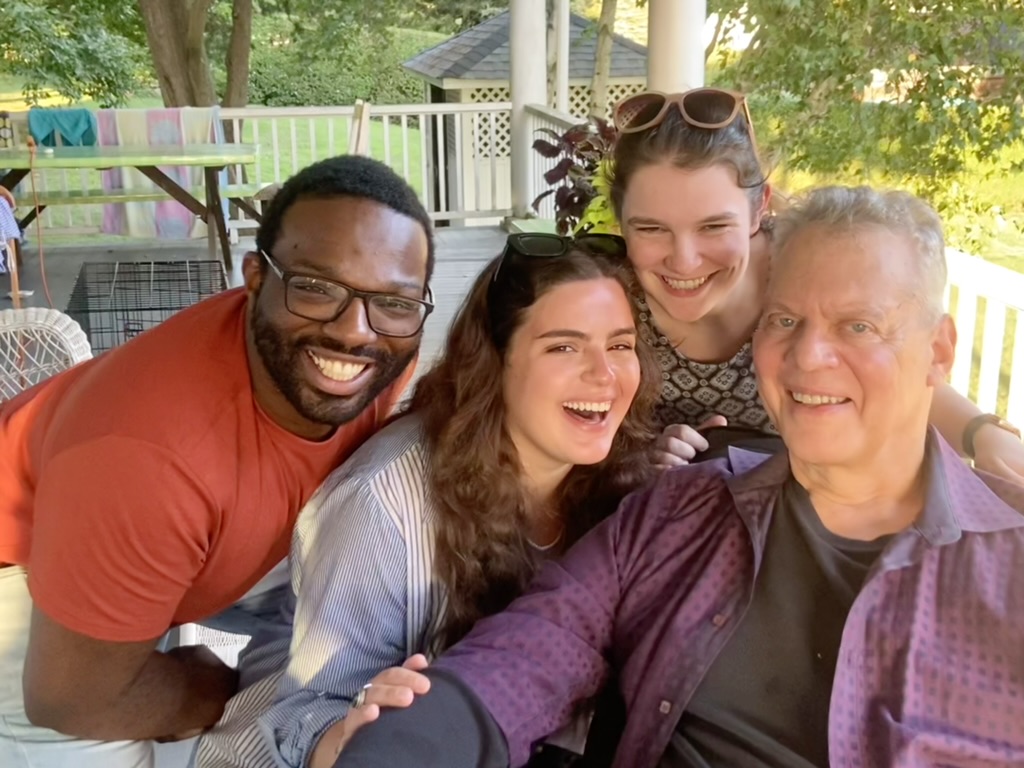Rehearsal today was a bifurcated experience for me. Of course my focus is on the cast—their vocalism, their musical accuracy, their sense of style, and (I never share this explicitly) their memorization. I’m there to guide them, and since we don’t have a stage director I also have to oversee the theatrical side of the performance. Blessedly, we won’t have much of a stage either, so ultimately it will be hard for the singers to go wrong on a 6’ x 12’ platform. Right now they are tending to roam around the room, while I try to rein in their free-form wandering. Once the platforms arrive tomorrow, a lot of that will take care of itself. They’ll know what to do.
What about that bifurcation, you wonder? Well, with the small, remaining slice of my attention I try to keep tabs on my own performance. I was decently ready for this show, though there were still a couple of slippy-slidey passages that I had not nailed to the floor. No biggie, that always happens. But inevitably more phrases start to fall into the slippy-slidey category, just when I have no time to massage them back into place. I am trying to avoid a slalom into a sloppy performance on Sunday. It feels like swimming upstream (or, more accurately, skiing uphill); the more I rehearse the songs the more shortcuts I take, and the more I go from snazzy music director to shambling rehearsal pianist. Or so I fear.
Let me cut myself a bit of slack: I had a few concrete obstacles today. One was the timbre of the very agéd Mason & Hamlin piano, which is an annual challenge. I don’t mean to sound ungrateful: the folks out here shelled out a bit of dough to replace some parts on the old baby grand, and I have to admit that it is at a much higher level of function than in the past. Still, the piano’s tangy, old-timey timbre doesn’t inspire me to my greatest heights. Translation: I felt as if I were playing kind of lousy today, and I decided to blame the instrument.
Then there are the Sondheim songs, which are driving me crazy. I have a major bone to pick with the published piano-vocal scores I am using for his songs, “You Must Meet My Wife” and “Hello Little Girl.” They simply don’t reproduce the color or the effect of the orchestrations. When I play the printed version of “You Must Meet My Wife” (from A Little Night Music) it sounds like a ponderous music box, not like the enchanted Ravel waltz I hear on the CD; while “Hello Little Girl” (from Into the Woods) has several passages with too many notes for ten fingers to cover. Yet I hate to disrespect Sondheim’s originals, no matter how dumb they sound.
Frankly, everything would have been better if I had just brought my reading glasses with me. They were safe at home, while I was semi-blind at Poquatuck Hall. 20 minutes into the session I abandoned all hope.
So apart from that, Madame Lincoln, how was the rehearsal? Actually pretty good. Shavon had not enjoyed a good night’s sleep, but you would’t have known it from his singing. You might possibly have guessed something was wrong when he (briefly) conked out at the outdoor café during break.
Highlights: I asked Sophia for something very simple—just to add more vibrato to the last note of “Lost and Found” from City of Angels—and when she did, her voice suddenly took on so much overtone that the room seemed to be filled with red velvet cake. Kerrigan located the innocence and ecstasy of “The Light in the Piazza” in the most touching way, and later on did a 180 with her sly, knowing portrayal of Venus in “I’m a Stranger Here Myself.”
Getting a song ready involves a lot of steps. The first ones are technical (notes, rhythms, vocal placement, breathing). Then come the artistic ones—starting with “make it real for yourself.” Once the songs have that inner flame, they still need to be proportioned so you aren’t playing the end at the beginning. And it’s always worth reminding performers that the character comes from you, but isn’t a replica of you. Sincerity isn’t enough.
I am finding that with our short rehearsal period, the best thing to do is to make sure the beginning is right, and that the end is right. Once that’s in place, the journey will assert itself. “You’re a young woman in love for the first time, and you have some major developmental issues,” I reminded Kerrigan about “The Light in the Piazza, “not an earnest, intense grad student. So don’t start by arguing your thesis.” And: “Don’t cry at the climax of ‘The Gentleman is a Dope,’” I told Sophia. “Just face the fact that your affair is over—you finally admit it out loud for the first time, it’s grim, but no weeping.” And for Shavon: “The guy in ‘Through a Keyhole” is one of those nebbishy people nobody notices, that’s how he gets to spy on everyone. And what he sees other people doing is the only sex life he has.”
Let’s see how it plays out tomorrow. This time, with reading glasses.
Get your tickets to 100 Years of Broadway Love here! Sun, Aug 27 at 3pm, Poquatuck Hall in Orient, NY.



0 Comments